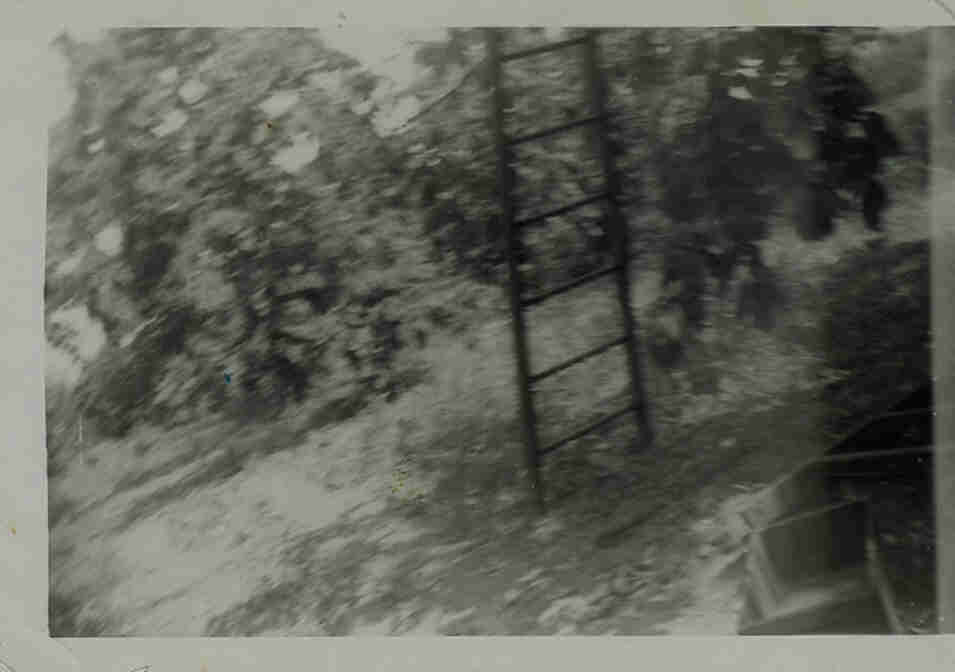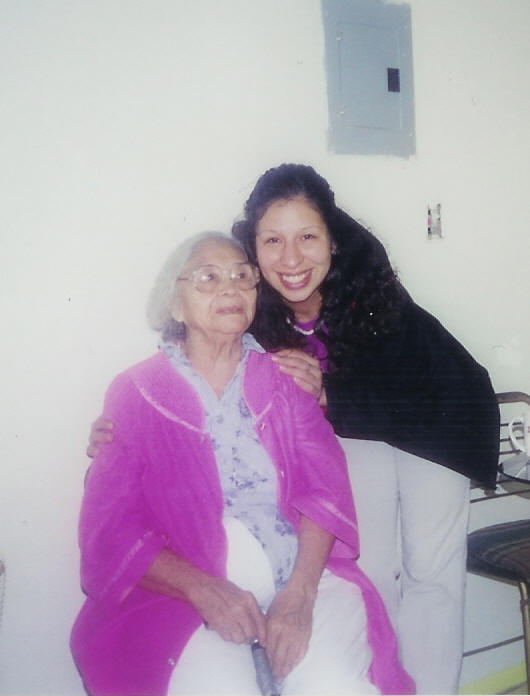TRANSCRIPTION
How did your family travel from the ranch in Slaton to the ranch in Lubbock?
Well, they were the wagons with those big four wheels. We didn't have a house and the
ranch wasn't ours, so we could pack the small amount of things we had and moved to
Lubbock.

What were the houses like on the ranches your family lived on?
We lived in many different houses on different ranches outside of Slaton and Lubbock.
Most of them were made of wood, with two rooms and a kitchen. The restroom was outside, you know
an outhouse with a hole of dirt. To take a bath, we would heat up water on the stove and bathe in
a large tub made of tin. That was our way of taking a shower.
Did your family own the ranch and/or house you all lived in?
No, way! We lived on a white man's land who would let us live in a house on his land.
They would also lend us part of the land that my daddy would plant and grow food on for the
family. He usually planted cabbage, tomatoes, chile, potatoes, watermelons...all except
meat.
So what kind of jobs did your dad have?
Oh, he always worked on the cotton fields,
we all did! First he did a lot of work plowing up the dirt, then planting the cotton seeds,
and finally picking the cotton throughout the seasons. Then he planted food all the time for
the family. He'd always invite nearby neighbors to have some of the vegetables he planted.
He'd give it away for free, and I'd get mad because he worked so hard and they would just
come and take it.

Did your mom work for an income for the family?
Mama would always take care of the house, but she'd help pick cotton with daddy.
She would also take care of the chickens. She would feed and raise them, and then later
kill them with her bare hands. She would clean them and everything so we'd have chicken
in many different ways for dinner. Mama had a stove where she would burn wood in to cook.
I used to love getting water from the
windmill for dinner. I'm still waiting for my fake
one to be put in my front yard!
How did your family get other foods?
Mama would bottle everything, like the tomatoes and corn, to have during the winter,
and it would still come out good! My daddy would pay the house owner for some fresh meat,
and he would receive it packaged in separate pieces. It could never be a lot, because we
didn't have electricity for a fridge or freezer.
What did your family do when someone got sick?
Only, uh, I don't remember there being a doctor around. Mama would cure us only for
a fever that I can remember, but we hardly ever got sick. For everything, Mama would boil
a lemon as a tea for us or have us take something like a laxative on a daily basis. Because
of that, we hardly ever got sick, and we'd get better quickly.
What were your hobbies growing up on the ranch?
I was just at the house. I liked being with Mama to help her clean, cook, and sew.
That's what I did a lot. Mama would take the empty flour sacks and draw flowers on them
for me. She would draw, and I would color them!
How often would you see your neighbors?
I didn't like playing with the neighbor girls. Mama would make me dolls. I'd make
them some eyes and dresses from pieces of material. I didn't like it when those girls would
come and take my dolls to play, so I'd hide them. They would come maybe twice a month with
their parents to get some vegetables.
Were you or any of your brothers and sisters able to attend school?
My sisters and brothers reached school, but I didn't. The buses didn't start
driving by the ranch when I was little, so I was already too old to attend school.
As one of the oldest, how were your chores compared to your brothers and sisters?
Connie never had to pick cotton with us, because she found work in the city after school.
Pilar, Chore, and Juan stopped picking cotton at an early age because school had started.
Where and how often did you family attend church activities?
We hardly ever attended church, because it was in the city, so maybe once a month.
There were nuns that came by our house to show us how to pray, and sometimes they would leave
books, you know, prayers for children.
What Catholic traditions did your family follow?
As children, we studied to receive our holy sacraments. I remember we received our
first communion at
Saint Joseph Catholic Church in Lubbock. Our God-parents would take us into
town when we received our holy sacraments.
After marriage, how was the travel with Pedro to Canada Verde?
My father-in-law had a
Model T, and that is what Pedro's family would travel in to Lubbock to go work
in the fields. So after getting married, that is how I traveled back to Canada Verde with
Pedro. We did struggle even though we had a car because of how slow it was compared to today.
How did moving to Canada Verde with Pedro and his family change things for you?
I lived with Pedro's whole family, so their house was small and full of people.
We lived there for seven years with his family! The floor in the kitchen was still made of
dirt, but Canada Verde was a very bare place. But my father-in-law always had what we needed
like transportation to get food once a month from nearby San Antonio.

Did you still work the fields with Pedro's family?
Oh yes! Pedro and I would go to Corpus Christi with his family to pick cotton, but
when there wasn't any work there, we would drive back to Lubbock to work. We would also go
to Michigan to pick cherries. We were always working, but that's why we always had what we
needed. That was the way of life. Besides travel, I still cooked and cleaned, but this time
for Pedro's family.

How did life change for you in San Antonio?
After living seven years with Pedro's family and a few more years with other relatives
of Pedro, we finally moved to San Antonio and built our house. Pedro bought our first piece
of land where I live now. I never learned how to drive, but Pedro and I didn't have to
drive so far for the things we needed anymore. I've lived here since, and I'm not moving!

ANALYSIS
From this interview, I learned how independent people had to be in the past. Even with the
lack of technology, many people found ways to manage to make ends meet. Harvesting, cattle,
wood, and water were the main resources...all natural resources which were very important
to stay alive. Today, there are many substitutions...some for the better and some that make
matter worse.
One thing I learned about my grandmother is that she actually traveled so far north to
Michigan. I know she doesn't remember the names of little towns she's been to while
traveling in Texas, but I had never heard about Michigan.
Since she knew this interview was for a project that someone else would hear about, she was
hesitant to let me put her words on paper. She's always telling me stories, but it was
different if I was going to tell someone else. She doesn't remember her dates, like her
wedding date, so I had to ask my dad and his brothers and sisters to at least get a good
estimated date.
This was a very effective way to learn about the past. It provides an internal viewpoint to
those in-between days that are left out of a text book. During an interview, you don't only
get to hear the words used but feel the emotions and expressions of the past.
ANNOTATED BIBLIOGRAPHY
Canada Verde, Texas. Cotton Fields.
The Handbook of Texas Online
is a multidisciplinary encyclopedia of Texas history, geography, and culture sponsored by the
Texas State Historical Association and the General Libraries at UT-Austin. It was produced
in partnership with the College of Liberal Arts and the General Libraries at the University of
Texas at Austin. Copyright © The Texas State Historical Association. Last Updated: May 6, 2004.
Canada Verde is where my grandmother first lived with Pedro, and the cotton fields was a
huge resource for their income.
Slaton, Texas.
Slaton, Texas - Your kind of Town
This is the official website for Slaton, Texas. This website maintained is by:
Sean Mueller & John Meurer
This is the place where my grandmother was born. She still has family there are visits
whenever she can.
Lubbock, Texas.
City of Lubbock
This is the official website for Lubbock, Texas. It is a virtual city government website.
Lubbock is the place my grandmother lived and worked near by on a ranch for most of
her years.
Windmills.
TelosNet of Colorado
This websites offers research on 20th Century Developments. The TelosNet of Colorado
provides links and resources for personal growth and therapy, as well as purposeful
Web sites for therapists and holistic health resource and service providers. My
grandmother is fascinated by windmills and remembers very clearing having to pump water out
of a windmill. She wishes to one day have a standing windmill in her front yard.
Saint Joseph Catholic Church.
Vatican Exhibit, About Lubbock This link provides the churches of Lubbock
and its surroundings listed with links to their web sites and contact information.
My grandmother received her holy sacraments with her brothers and sisters at St. Joseph's
Catholic Church.
Return to Oral History Projects



